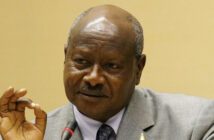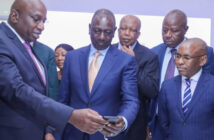The visiting Managing Director of International Monetary Fund (IMF), Christine Lagarde has given a ringing endorsement to the economic policies of the administration of President Muhammadu Buhari, declaring that all measures taken so far as promising.
However, she noted that Nigeria needed to show more flexibility and stronger discipline in the implementation of its fiscal policies. The IMF Boss spoke after meeting with the president and his economic team including Vice President Yemi Osinbajo and the Minister of Finance, Kemi Adeosun, her counterpart in the Budget and National Planning, Udoma Udo Udoma and the Central Bank of Nigeria (CBN) Governor Godwin Emefiele.
She used the occasion to clear the air about the public perception of IMF as an anti-people institution, noting that her visit to the country along side her team was to work with the leadership to come out with the appropriate fiscal mechanism that would help the economy.
She said her admonition to the Nigerian government was against the background of dwindling oil price and the need to support the poor, noting that her discussion with the Buhari economic team was within the context of the country being the largest economy in Africa. She noted that, therefore, the economic agenda of the Buhari administration was the issue in focus, especially because of the impact any policy somersault would have on the neighbouring countries in the West African sub-region.
She disclosed that IMF’s evaluation team would visit the country next week to scrutinise the 2016 budget currently before the National Assembly with a view to coming out with a response and guide the country accordingly, noting that the fund had no policy of interference with how member-countries run their fiscal policies.
She dismissed speculations that the fund came to negotiate on how Nigeria may obtain fresh loans with stringent conditions, noting that Nigeria had no need for loans, though insisting that the administration must work on fiscal discipline. In her words: “First, let me make it clear that I’m not here nor is my team in this country to negotiate a loan with conditionalities. We are not into programme negotiations and frankly at this point in time, given the determination, resilience displayed by the president and his team, I don’t see why an IMF programme will be needed.
“Of course, discipline is going to be needed as implementation is going to be key for the objectives and the ambitions to serve the country well, in order for it to be actually sustainable. We believe that with a very clear primary ambition to support the poor people of Nigeria, there could be added flexibility in the monetary policy, particularly if as we think, the price of oil is likely to be possibly low for longer, because clearly the authorities should not deplete the reserves of the country, simply because of rules that will be exceedingly rigid. I’m not suggesting that the rigidity be totally removed, but some degree of flexibility will be enough.”
The IMF boss said she discussed with Buhari “the challenges ahead stemming from oil price reduction, the necessity to apply fiscal discipline and the need to also respond to the population’s needs while addressing the medium-term specificities of improving the competitiveness of Nigeria and yet also focusing on the short-term fiscal situation which requires that revenue sources be identified in order to compensate the shortfall resulting from oil price decline. “Oil is not the major contributor to the Nigerian Gross Domestic Product (GDP); it is only about 40 per cent but it is a big source of revenue for the government.
Therefore, we discussed with the president, vice president and the minister of finance and minister of budget how more efficiency, more transparency, better accountability, the enlarging the base of revenue could actually contribute to sound budget going forward. “It is not for me here and now to actually approve or comment on the budget because we have procedures in the IMF under which a team of economists is going to come next week actually to do what we call the Article 4 which is to review the budget and hope that they will have good discussion with partners, IMF on one hand and the country’s authorities on the other hand.
But what I certainly mentioned to the president was that his determination to fight corruption and his determination to bring about transparency and accountability at all levels of the economy are very important agenda items and very ambitious goal that needed to be deliberated upon which he, himself is definitely committed to as he indicated this morning and as he inspires his team members.”
Largarde who said she would have further discussions with the finance minister and CBN governor on the issue of fiscal discipline, financing monetary policies and the degree of flexibility, noted that though Nigeria had a large, vibrant economy, “the nation still had to deal with poor people, a lot of inequality and those two components should certainly be the drivers of reforms.”
She described as outdated, insinuations that IMF was all about prescribing anti-people policies saying: “Certainly, in the last four and a half years since I have been managing director of this institution, this is not the recipe we adopted and this is certainly not the feedback I have received from the countries that we have worked with.”



